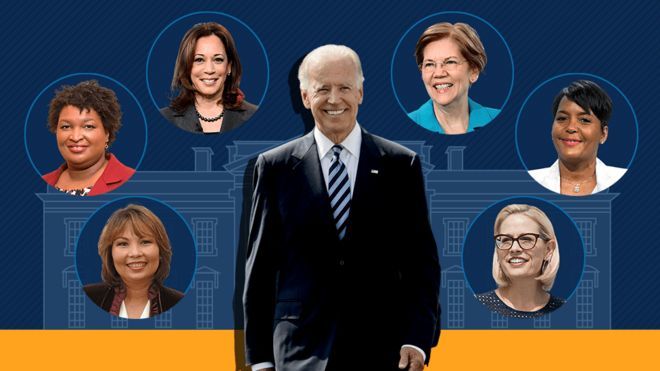 |
|
|
During the final Democratic primary debate in March, Joe Biden pledged that if he were to win the party's presidential nomination, he would choose a woman as his vice-presidential candidate.
A lot has happened since then, not the least of which is Biden securing the required Democratic Convention delegates to become his party's presumptive nominee. Even before that point, however, speculation swirled around a dozen or so contenders to be Biden's running mate.
Buzz around the various candidates has risen and fallen as the nation has been buffeted by a viral pandemic, economic disruption and mass protests and racial tension.
If the former vice-president follows through with his pledge, it would mark only the third time a major party has selected a woman for the number two spot - four years after Hillary Clinton became the first woman to be a presidential nominee.
The move would suggest the Democrats are looking to secure the advantage they have among female voters according to polls, and perhaps insulate Biden from allegations that he engaged in unwanted physical contact with women.
Biden has said he will announce his choice in early August. In the meantime, here are the current top contenders - and how they stack up.
 |
|
|
Kamala Harris is widely considered the front-runner for Biden's vice-presidential slot. She has a resume that includes time in the US Senate and as California's attorney general, as well as San Francisco's district attorney. She has a diverse background, with a mother from India and father from Jamaica. She's at least been somewhat vetted by the national media, given that she ran for president last year and was considered, for a time, as a top-tier candidate.
She did have a dust-up with Biden in the first primary debate last June, where she suggested his past views against desegregating schools through mandatory busing was hurtful, but that was a lifetime ago in modern US politics.
Harris brings access to California money (she raised $2m for Biden in a recent virtual event), she's quick on her feet, and she would satisfy those who are calling for Biden to add a black woman to the ticket. She has won praise from a wide range of Democrats for being an outspoken advocate for police reform during the recent mass demonstrations. Biden-Harris felt like the obvious ticket a year ago - and it still does.
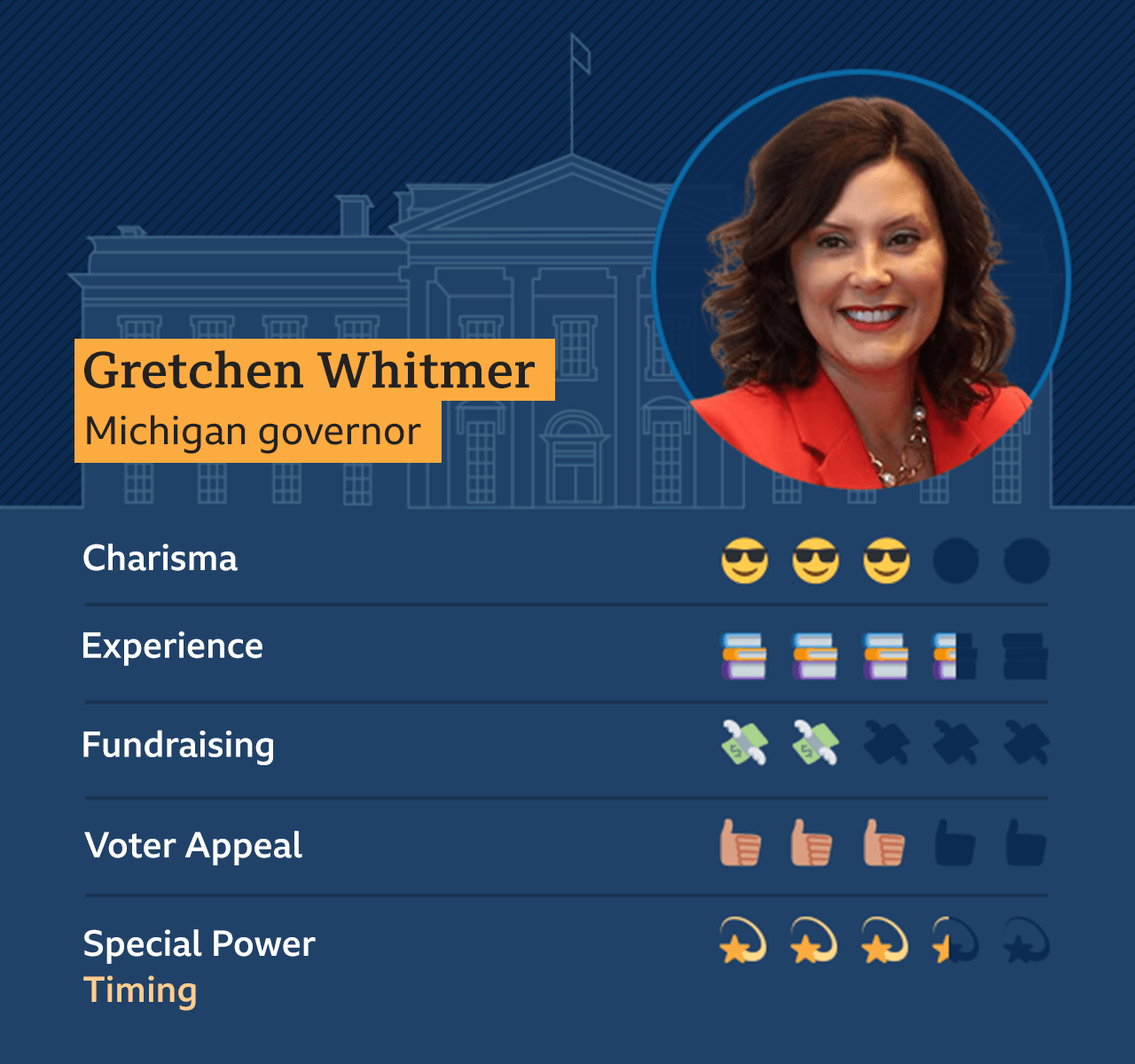 |
Just a few months ago, there wasn't a lot of buzz around Gretchen Whitmer, a former state legislator in her second year as Michigan's governor. Then the coronavirus pandemic hit, and she became the face of her state's response, which included occasional criticism of what she viewed as the federal government's lacklustre handling of the outbreak. That made her a target for Donald Trump's vitriol - and elevated her national profile.
Her decision to enact sweeping social distancing and business-shutdown measures as Michigan became one of the top US hotspots of the coronavirus outbreak also led to several angry conservative-organised protests in her state, boosting her standing among Democrats.
In 2016 Hillary Clinton narrowly lost Michigan to Donald Trump - one of the upsets that helped decide the election. If Biden hopes to avoid a similar outcome, he might decide to put a Michigan native on the ticket.
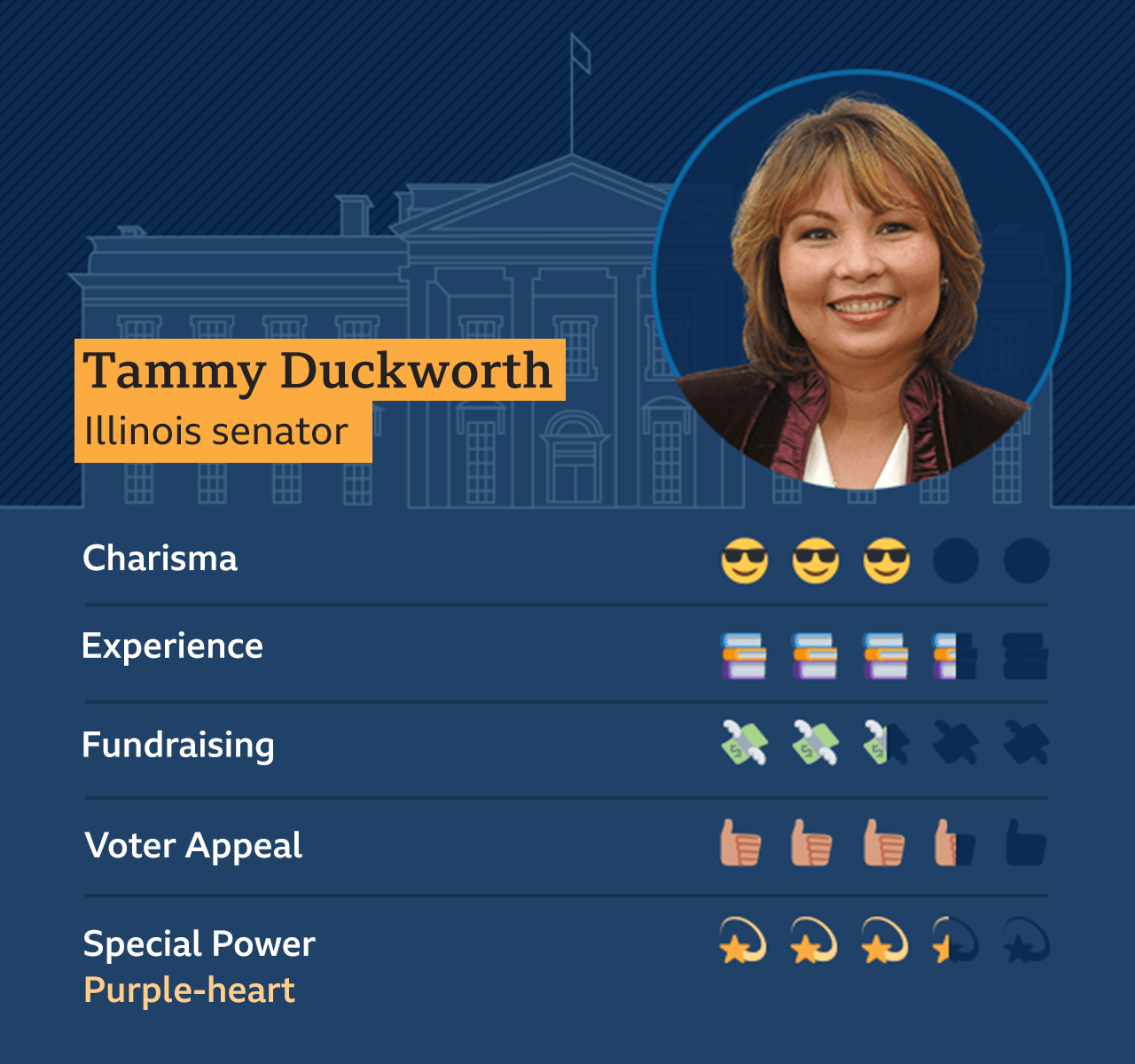 |
|
|
Tammy Duckworth, the junior senator from Illinois, has a CV that jumps off the page. She lost both her legs when the Army helicopter she was piloting was shot down by insurgents in Iraq. She stayed in the military and retired with the rank of lieutenant colonel, before becoming an assistant secretary in President Barack Obama's Department of Veteran Affairs.
Duckworth served in the House of Representatives and then won her Senate seat in 2016. She is the first Thai-American woman elected to Congress, as well as the first double-amputee woman. In 2018 she became the first woman to give birth while serving in the Senate.
Illinois is a safe Democratic state, but its proximity to key Midwest battlegrounds - as well as her middle-of-the-road politics - could make her an attractive pick for Biden.
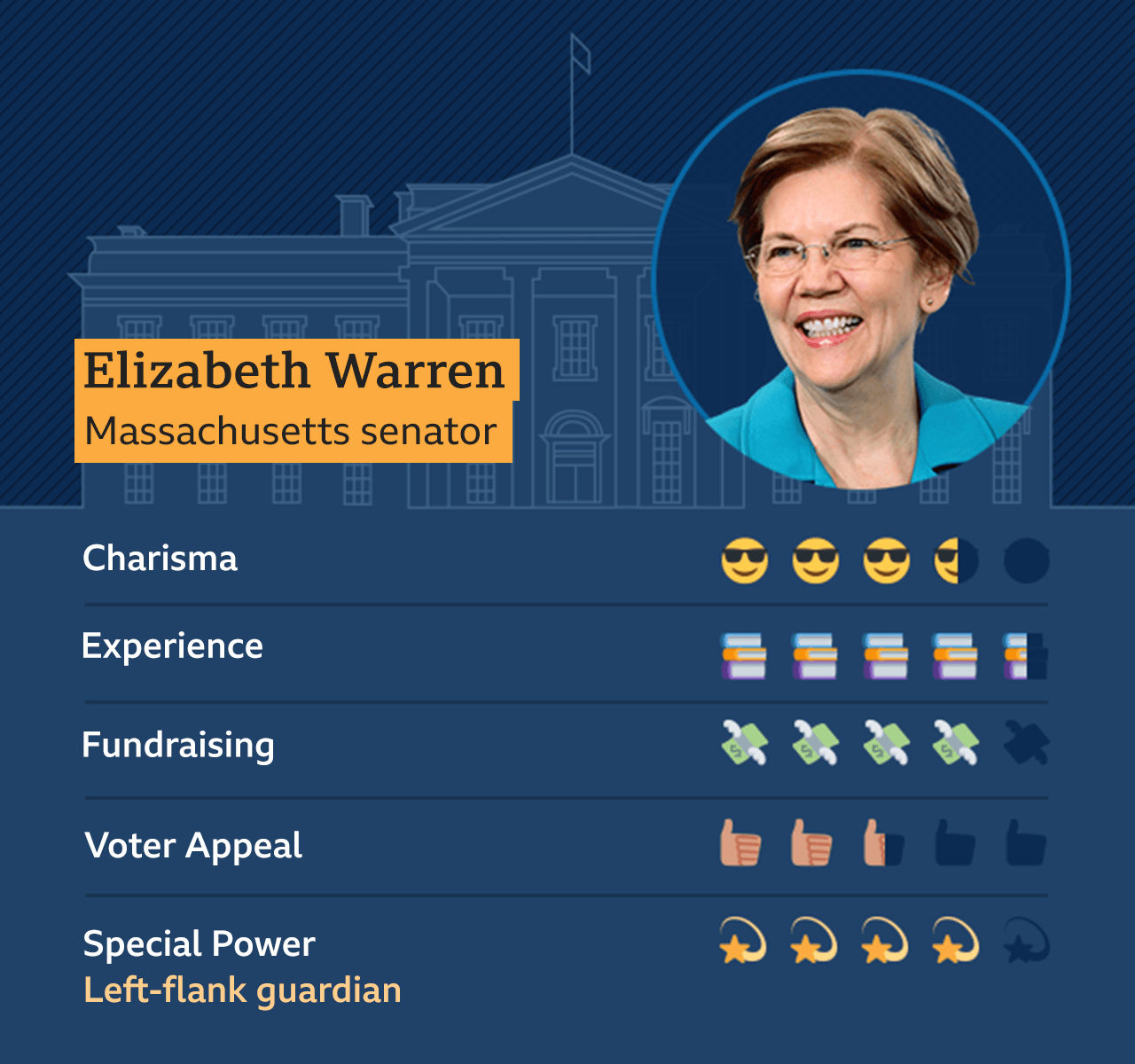 |
Elizabeth Warren's campaign for the Democratic presidential nomination is a story of what might have been. Her "I have a plan for that" mantra seemed to strike a chord with Democrats, and she led the polls for months in mid-2019, drawing enthusiastic crowds and cruising through the early debates with seeming ease. Then her support faded, as many progressives drifted back to Bernie Sanders, while moderates opted for younger candidates like Pete Buttigieg.
Many progressives expected her to endorse Sanders when she dropped out of the race in early March, so her decision to hold back may have earned her some appreciation from the Biden team.
Now they have the opportunity to return the favour by offering Warren the running-mate spot. While there was some friction between the Sanders and Warren camps, Warren would still be a significant signal that Biden wants to reach out to his party's left wing - and govern as more of a progressive than he let on during the campaign.
With the nation facing a serious economic crisis, Warren could lend some liberal policy heft to the Democratic ticket.
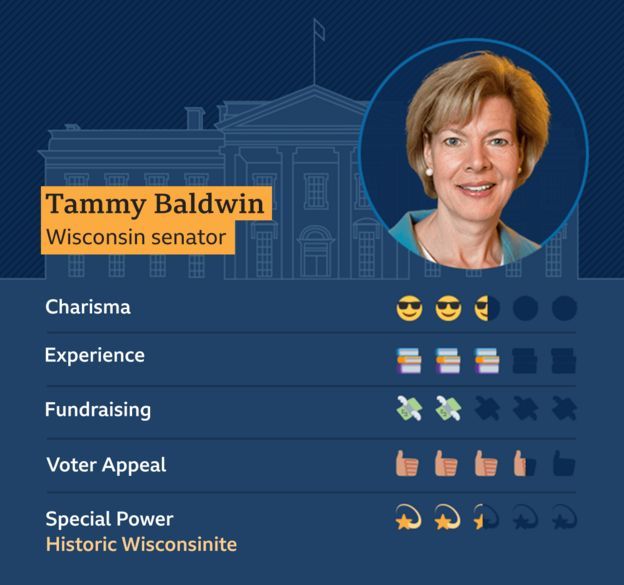 |
|
|
Four years ago, Hillary Clinton was lambasted for never campaigning in Wisconsin during the general election, then losing the pivotal state to Donald Trump as her Midwest Democratic "blue wall" crumbled. Democrats have pledged not to repeat that mistake, going so far as to pick Milwaukee as the site of their (now delayed) national convention.
If Biden wants to lean into the whole "don't ignore Wisconsin" theme, he couldn't do much better than to pick an actual Wisconsinite as his running mate. Tammy Baldwin is in her second term as one of the state's senators, having served in the House of Representatives for 14 years prior to that.
Her selection would also be historic, as she would become the first openly gay person to serve on a major party's ticket - just as she became the first openly gay member of the Senate. In a season where Pete Buttigieg, who is also gay, proved to be a potent electoral force in Democratic politics, there may be particular appeal for such a move.
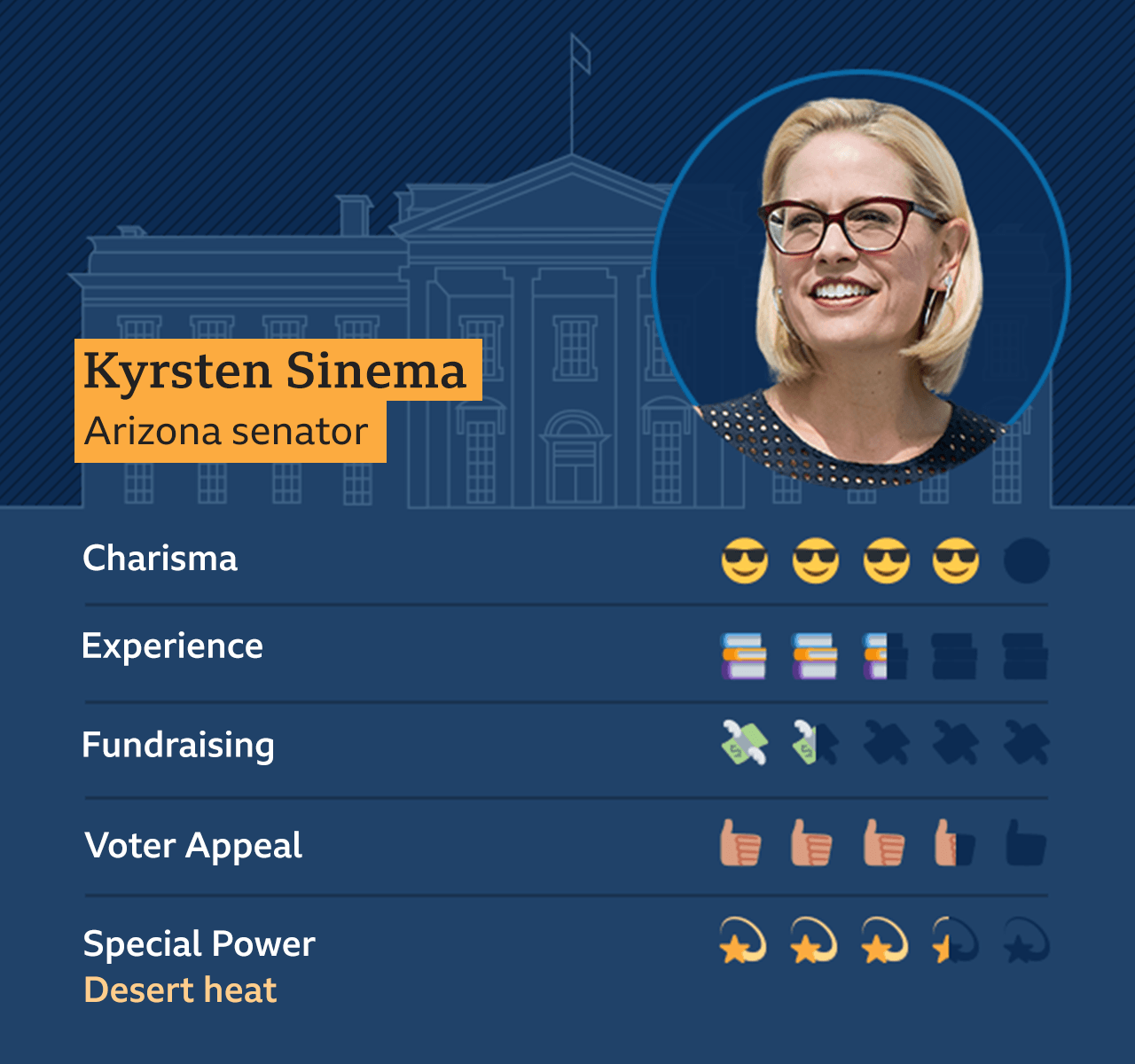 |
|
|
There's a line of thought among Democrats that this election's Wisconsin is not, in fact, Wisconsin, it's Arizona. The desert state, they say, will be the "tipping point" that delivers the election to Biden, freeing him from worrying about fickle Wisconsin voters. Polls suggest Biden's brand of political moderation, combined with Donald Trump's divisive rhetoric on immigration, have the state leaning toward the Democrats. One strategy for securing that lead would be to put an Arizonan on the ticket.
In 2018, Kyrsten Sinema became the first Democrat to win an Arizona Senate seat in 30 years. She's young, telegenic and politically centrist - perhaps too centrist, according to the party's left-wing activists.
She is a bit quirky - turning heads recently when she wore a purple wig on the floor of the Senate. It could present a beneficial contrast with the often staid Biden.
If Biden picks her as his running mate, she would make history as the first openly bisexual person on a presidential ticket.
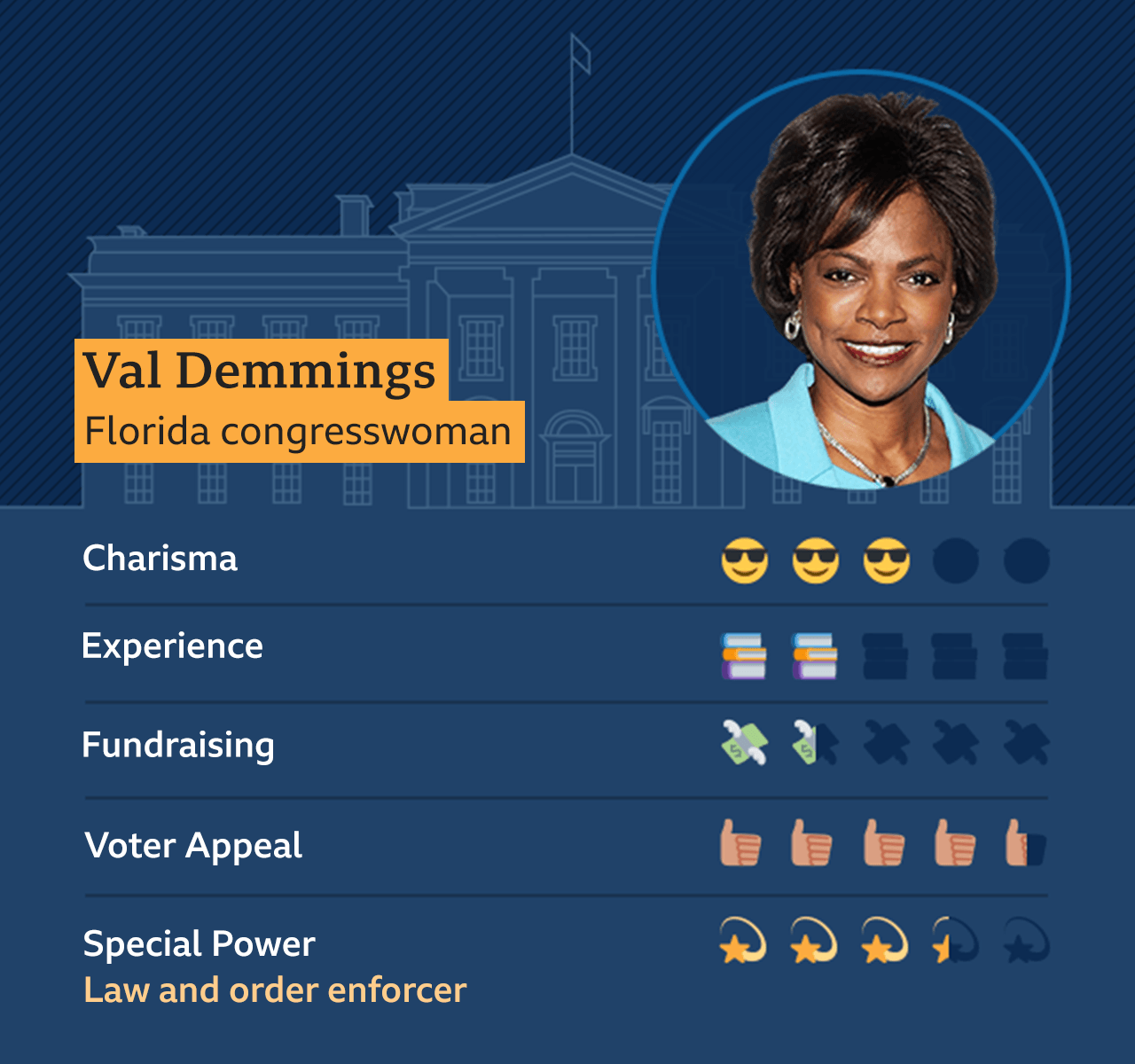 |
|
|
Last year, Val Demmings was a little-known Democratic back-bencher in Congress. Then House Speaker Nancy Pelosi gave her a high-visibility role as one of the impeachment managers - the congressional equivalent of prosecutors - during Donald Trump's January Senate trial.
Even before the mass protests over the death of George Floyd made racial justice a top issue among voters, the black former chief-of-police from Orlando, Florida, was on the Biden team's radar as a possible vice-presidential pick. Now she's getting more than just a passing mention.
Cutting against her is her relative lack of political experience and low name recognition. But if Biden feels she can hold up under the intense scrutiny of being on a national ticket, she could be the woman for this particular national moment - and a signal that Biden is serious about making tackling racism and police reform his top issues.
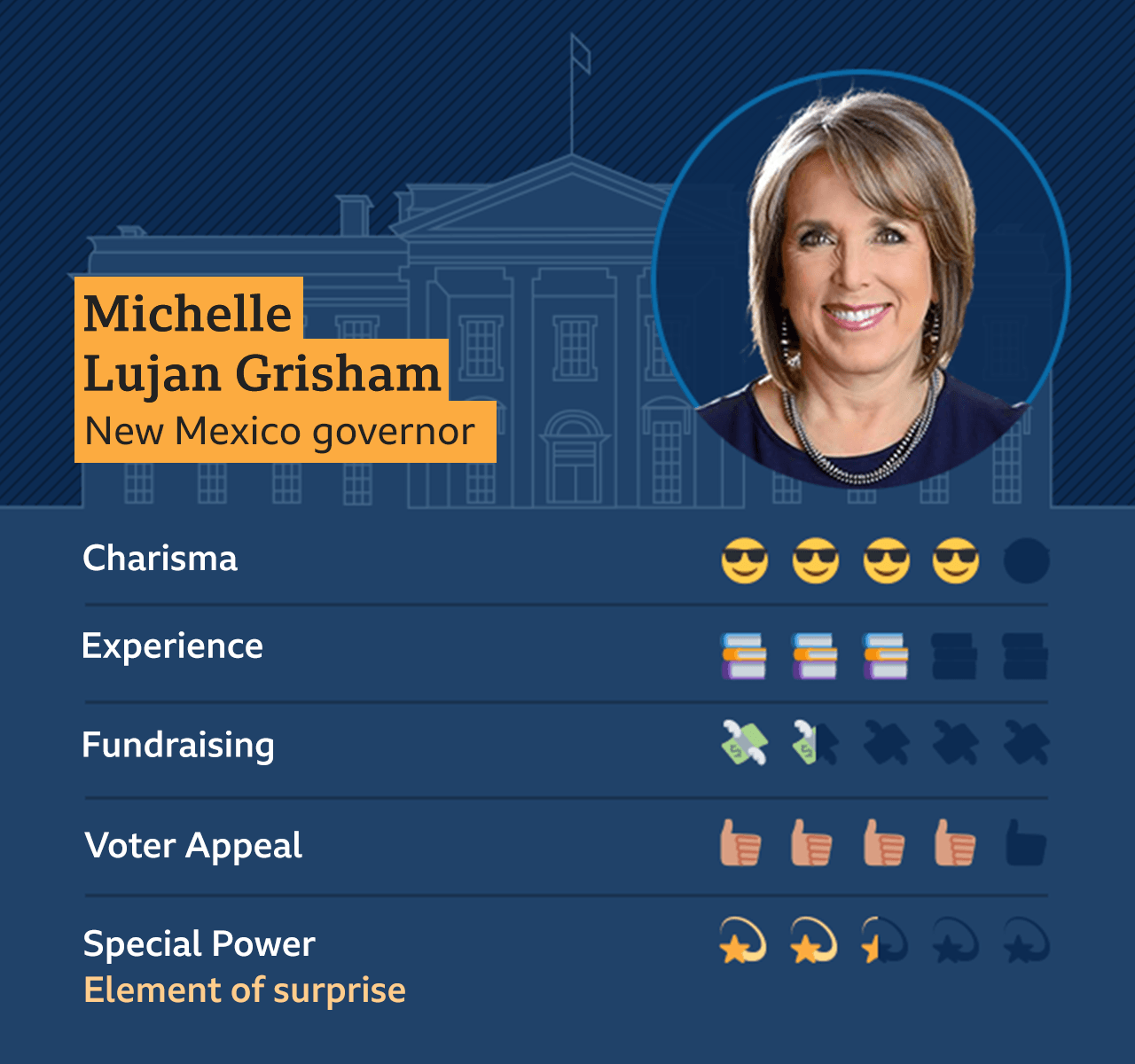 |
|
|
During the primaries, Hispanics were consistently one of Biden's weakest voting blocs. In states like California, Texas and Nevada, liberal champion Bernie Sanders outpaced Biden among a demographic that is well represented in numerous states that will be battlegrounds in the November general election.
If Biden decides he needs to shore up his support among one of the fastest-growing segments of the US electorate, New Mexico's first-term governor Michelle Lujan Grisham is the most obvious choice for a running mate now that Senator Catherine Cortez Masto has said she's not interested.
Unlike Masto's Nevada, New Mexico is a reliable Democratic state in presidential races, with few electoral votes. Lujan was comfortably elected governor after Republicans held the office for two terms, however. The 60-year-old Lujan previously served in Congress and as her state's health secretary - a helpful CV entry in the pandemic age.
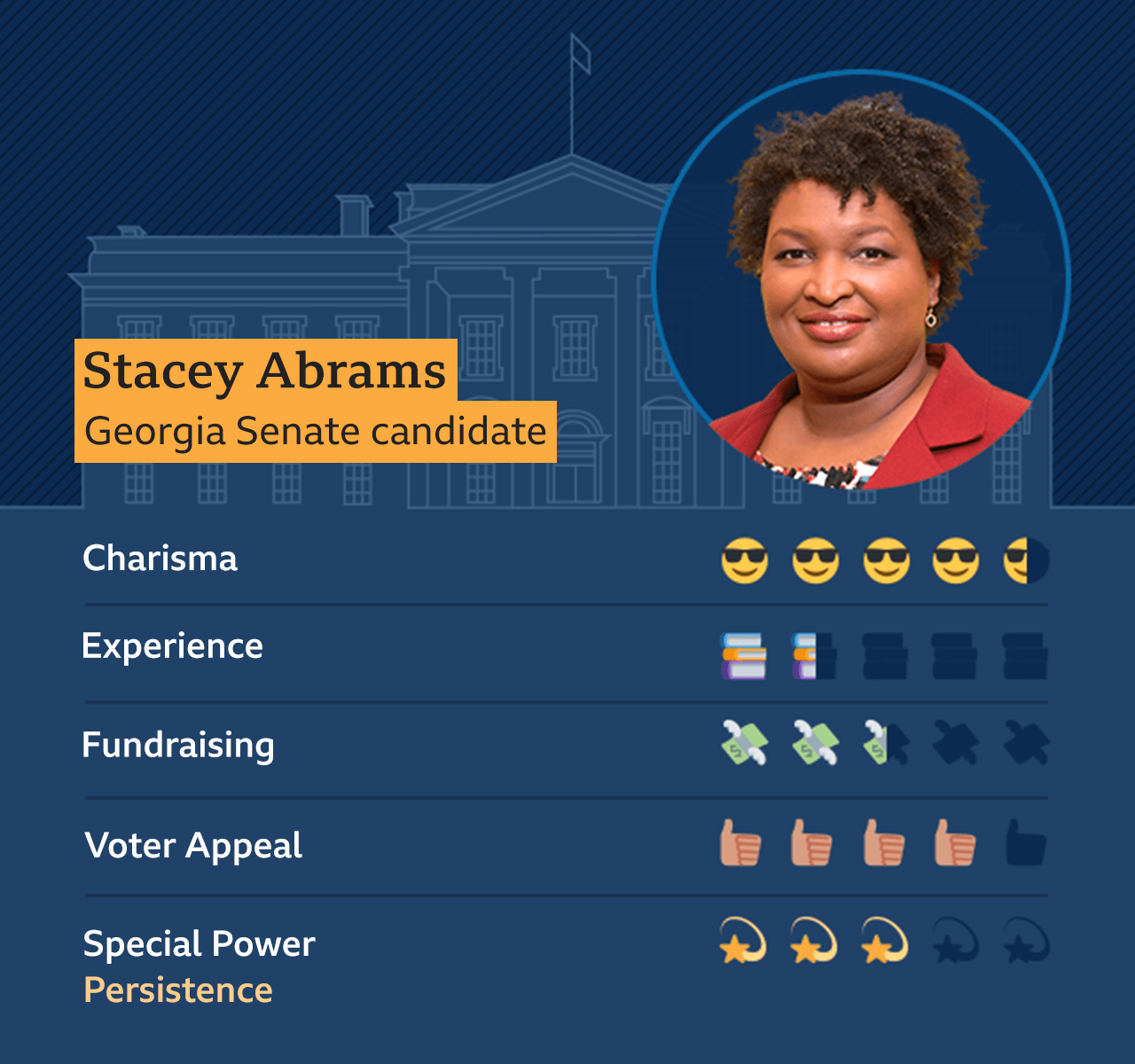 |
|
|
Stacey Abrams doesn't have much of a traditional political CV for a vice-presidential pick. She spent 10 years as a member of the Georgia House of Representatives. She ran and narrowly lost the 2018 race to be the state's governor - a defeat she attributed, in part, to what she alleges was voter suppression by her Republican opponent.
What Abrams has, however, is a voice that has resonated powerfully with much of the Democratic base. Her activism on voting rights has helped boost it as an issue for the party. She gave the Democratic response to Donald Trump's 2019 State of the Union Address, making her the first black woman chosen for the task.
Unlike her rivals, Abrams has actively campaigned to be Biden's vice-presidential pick - a move that has elicited cringes from some, while others see it as refreshing honesty. Abrams is a rising star within the party, the face of a demographic segment of the Democratic Party that has traditionally been underrepresented in leadership positions. Even if she doesn't become the pick, the early buzz around her has helped advance the prospects of all the black women under Biden's consideration.
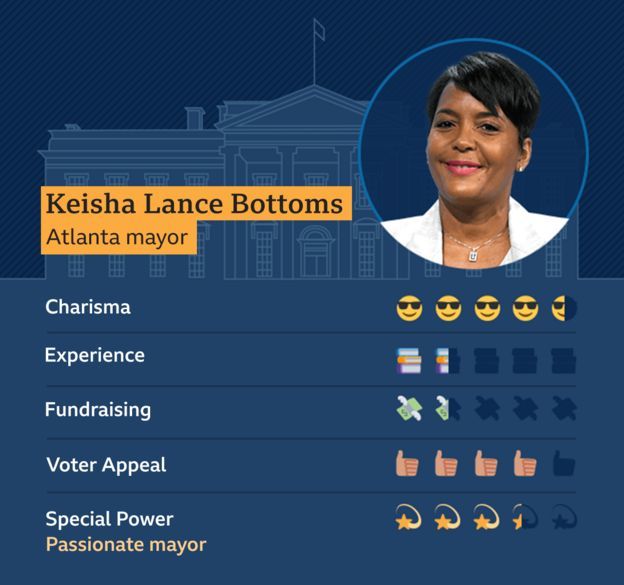 |
|
|
The nationwide protests over George Floyd's death while in the custody of Minneapolis police gave a handful of big-city mayors a national platform, as they dealt with difficult issues of racism, law enforcement and civil unrest in their jurisdictions. Atlanta Mayor Keisha Lance Bottoms, in particular, proved particularly adept at balancing official responsibilities while expressing her personal experiences as a black woman raising four children in these turbulent times.
A heartfelt Vice interview, in which she explained the challenge of having to tell her 12-year-old son not to play with toy guns lest he provoke an incident with police, was praised as both raw and powerful.
A first-term mayor would be an unconventional pick for Biden, but Bottoms is from Georgia - a traditionally conservative state that is trending toward being an electoral battleground. She's also won praise from Democrats for waging political battles with the state's Republican governor over when and how to ease business closures and shelter-in-place orders during the coronavirus pandemic.
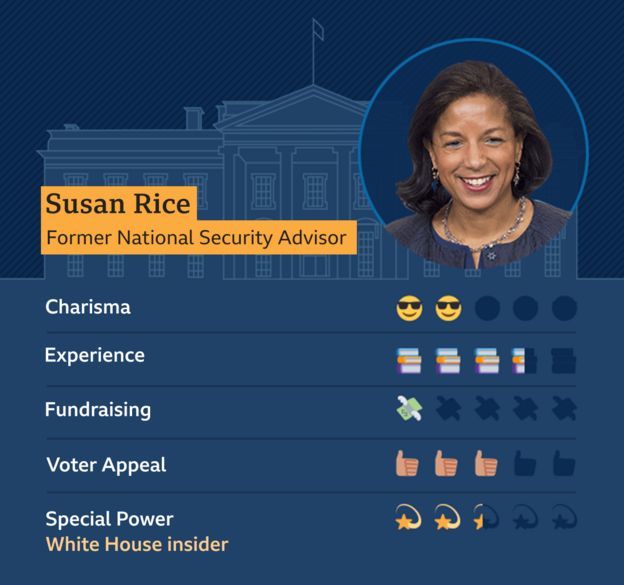 |
|
|
Susan Rice is a bit of a surprise entry on this list, given that she has no experience holding elected office or campaigning in general, and is a relative unknown for most Americans. The diplomat is well-known to Biden, however, as she served in the Obama White House with him as national security adviser after a stint as the US representative to the United Nations.
If Rice is the pick, she could play a key role in a Biden foreign policy team, suggesting that international relations will be a focus for his administration.
Rice was a lightning rod for criticism during her Obama years, however. Republicans accused her of deceiving the American public about the reasons behind the 2012 attack on the US consulate in Benghazi that resulted in the death of the US ambassador to Libya and three other Americans.
Reports that the Biden team has already vetted Rice for the vice-presidential slot suggests the campaign is casting a wide net in looking for a black woman running mate.
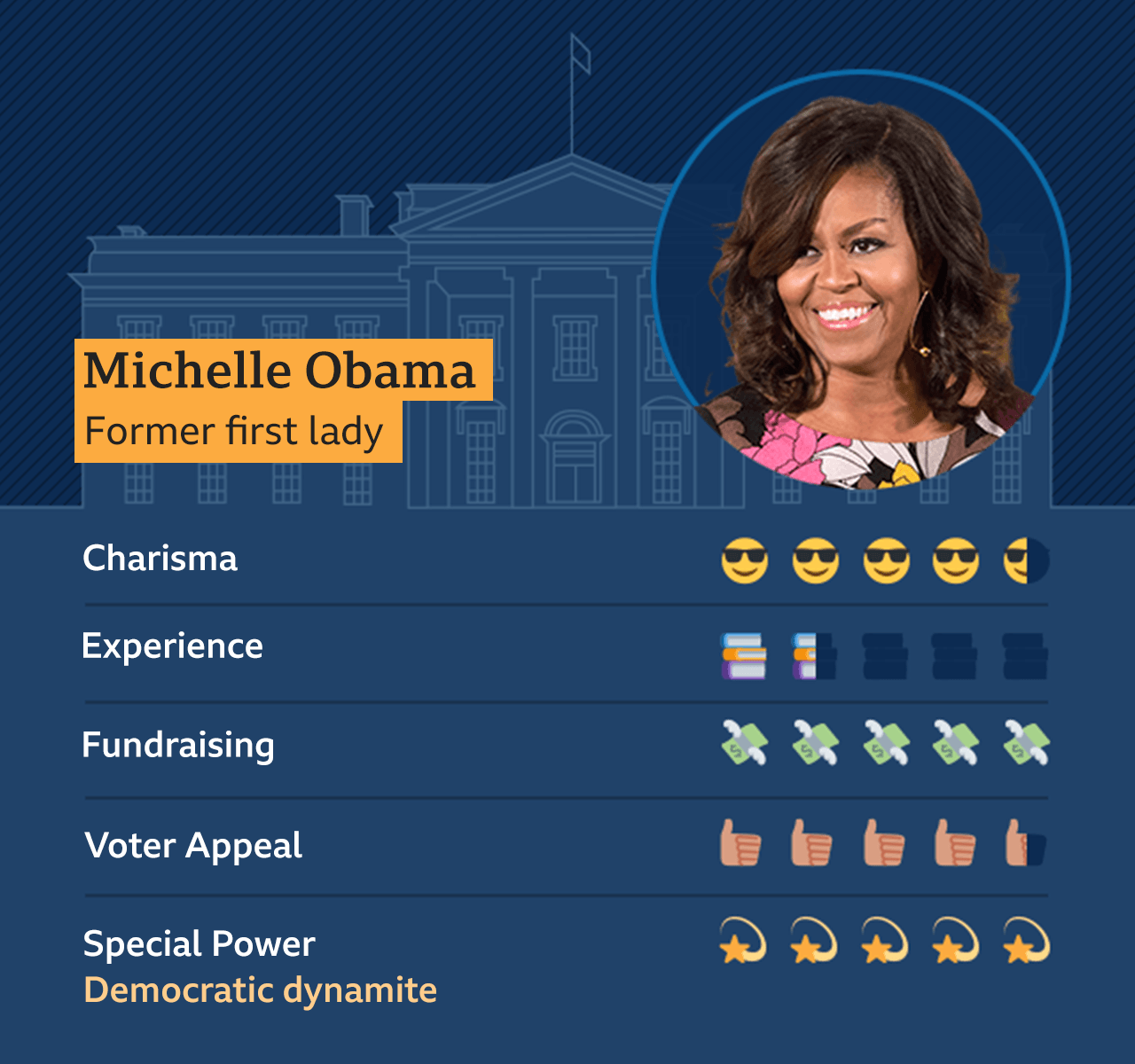 |
|
|
The traditional first rule for selecting a vice-president is to do no harm. Given that the choice doesn't offer much of a boost to the ticket, the theory goes, it is better to pick someone safe, who minimises the risk of embarrassment and won't overshadow the presidential nominee.
Most of the other candidates on this list fall somewhere on the "very safe" to "mostly safe" spectrum. Former US First Lady Michelle Obama is in a category by herself.
She's beloved by a large swathe of the American public and is a near universally recognisable figure. Yes, she might steal the stage from Biden, but what better way for Biden to cast himself as the continuation of Obama's presidential legacy than to put his wife on the ticket?
A Biden-Obama ticket would electrify the Democratic base - particularly black voters who turned out in record numbers for Obama-Biden in 2008 and 2012.
The only kink in such a bold plan is that Michelle Obama has shown less than zero interest in entering politics. In her autobiography she frequently complained about the toll her husband's political career took on her life and marriage - and she seems very happy to have those travails in the rear-view mirror. BBC